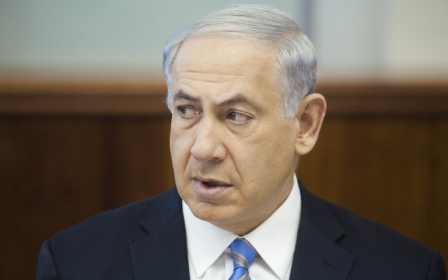Israel's Labor struggling to dislodge Netanyahu as vote approaches

Israel’s Labor party emerged out of its primary election with a formidable list of candidates - but so far, no significant increase in its chances for composing the next government when Israel goes to the polls on 17 March. The social-democratic party, which is running under a joint banner with Tzipi Livni’s Hatnua, a liberal party formed in 2012, boasts three women in the top five places on the slate - Livni herself, former party leader Shelly Yachimovich, and Stav Shaffir, the youngest member of the Kneeset and a key organizer of social justice protests in 2011. Up to nine women are expected to be elected if the Labor party lives up to the poll predictions of 24 seats, compared to a mere two in the ruling Likud party.
Shaffir, who entered party politics just over two years ago, has built up a reputation as a ferocious parliamentarian, relying on a large and enthusiastic team of volunteer researchers to wage weekly battles over state budgets and corruption cases. The 29-year-old has clashed with the chairman of Israel’s Finance Committee over funding for Israeli settlements in the occupied territories, and was forcibly removed from the committee room on several occasions - nevertheless stalling several large financial transfers in the process.
Though left-wing activists have criticized Shaffir for not engaging further on the issue of Israel’s occupation of Palestine her strategy of lambasting settlement funding appears to have paid off. If Labor triumphs in the elections, or joins the ruling coalition, Shaffir has every right to expect a cabinet seat. Should she bring the same energy and zeal to ministerial work as she has done as an activist, her controversial strategy of using a formerly horizontal, non-parliamentarian movement to launch a political career will have been vindicated.
Despite the promising list of candidates, and widespread electoral fatigue with Prime Minister Benjamin Netanyahu, the chances of Labor seizing power remain relatively slim. On Wednesday, the party was polling neck and neck with the Likud. For Labor this will be too close for comfort; even a two-seat lead is not enough to guarantee a party control of the government. Tzipi Livni, a former foreign minister and one Israel’s leading voices for the two-state solution, should know it better than anyone. She won the 2009 parliamentary elections by one seat, only to be outbid by Netanyahu in the coalition talks and watch her party, Kadima, fall into obscurity (after a disastrous short-lived coalition with Netanyahu in 2010, the party lost 28 seats in the 2013 elections, and is now not even projected to pass the electoral bar.)
Though Labor’s history and deeper roots make total collapse less likely, the party is threatened by another troubling aspect of Israeli politics; namely the emergence of a non-ideological, “centrist” slot in Israeli politics that has failed to produce a ruling party since Kadima’s defeat in 2009 and which sucks up protest votes that ostensibly should have gone to an established opposition party.
The winning centrist party then normally throws its weight behind the right-wing contender, not least because the Left in Israel is so loathed it’s almost always better to be seen as a pragmatic moderate in a right-wing government than the group which enables a left-wing government to assume power.
In the upcoming national elections the crucial center slot will be contested by at least three parties - Yair Lapid’s Yesh Atid, Moshe Kahlon’s Kulanu and, implausibly, Avigdor Lieberman’s Yisrael Beitenu. While the new Labor list is expected to clip a handful of votes from these three parties. between them they poll at as many seats as Labor, if not more. This is partly because of the usual attractions of new centrist party - the promise of professional technocrats untainted by the wheeling and dealing of politicians, which has Israelis as exasperated as anyone else in most representative democracies. But partly it’s also because of Labor’s two toxic legacies, legacies which the current list seems powerless to overcome.
The first, quite clearly, is that of the Oslo Accords. Twenty years later, Labor is still struggling to wash off the stain that was known as a peace process, and was anything but. While Palestinians, as per usual, were hit by the impact of Oslo considerably worse that the Israelis, for most of us who can remember the 1990’s, Labor’s three short-lived attempts at government were marked by what seemed like a complete collapse of personal security, with dozens of suicide bombings and other forms of attacks by Palestinian factions that Israel and the PLO never attempted to include in the peace process - indeed, factions which the Oslo process was meant to undermine.
This miserable chapter, accompanied by a maddeningly incongruous idealisation of “peace” and the “peace process” ended in such a complete collapse in 2000 that Labor’s last prime minister, Ehud Barak, tried claiming credit for demolishing the process rather than defend what was by then the patently indefensible.
Today’s Labor is trying to steer clear of these memories by refusing to engage with the Palestinian issue altogether - note the party’s near-total silence during the last Gaza war - but this merely makes it seem as if it has nothing decisive to say about security, an issue Israelis still regard as paramount. The only alternative to peace or war that Herzog might be able to offer is a unilateral withdrawal - but even that is likely to backfire, considering all too recent memories of rocket fire on Tel Aviv from the last territory Israel evacuated in such a manner.
The other poisonous legacy of Labor is simply Labor being itself - in other words, the actual successor party of Mapai, the notoriously elitist founding party of the state. The elite Labor represents - that of the Ashkenazi, secular Jews, Israel’s equivalent of the American WASPs - is on the decline in every conceivable way, with more and more religious, Mizrahi and immigrant Jews making headway in every walk of life, from public service, to judiciary, to private sector and the arts.
But if you looked at Labor’s list, you wouldn’t know it. The list does feature a handful of non-Ashkenazi Jews - like veteran parliamentarian Eitan Cabel and newcomer Revital Sueid, a criminal lawyer making her first foray into politics. But overall, the party looks as ancien regime as it ever did, with the only prominent figure identified with the Mizrahi struggle Professor Yossi Yona, relegated to the 23rd place on the party slate, and only one Palestinian, sportscaster Zuheir Baalul. Even though secular Jews are a minority in Israel, no religious Jews - who compose the majority of the Jewish working poor and the unemployed - are represented.
If Labor intends to bet it all on the ticket of social justice and good governance, it needs to give a lot more room to the voices of those who would need it the most - the very same people it has done its utmost to alienate over its six-decade history. Unfortunately, it doesn’t look like it will be happening this time around, either.
New MEE newsletter: Jerusalem Dispatch
Sign up to get the latest insights and analysis on Israel-Palestine, alongside Turkey Unpacked and other MEE newsletters
Middle East Eye delivers independent and unrivalled coverage and analysis of the Middle East, North Africa and beyond. To learn more about republishing this content and the associated fees, please fill out this form. More about MEE can be found here.




